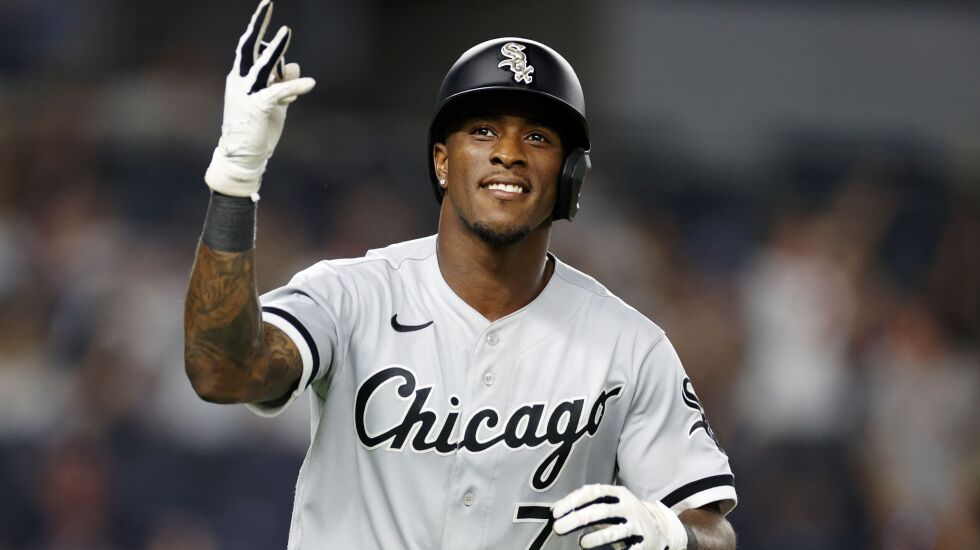
Anyone who has played in the alley, hung out in the street or stood in the schoolyard knows what it is to be messed with, picked at, worked on. To be mocked, made fun of, condescended to. To be hassled, wound up, provoked.
By a young age, we’ve seen it, heard it, maybe even learned to smell it coming. We are sentient beings.
White Sox shortstop Tim Anderson says the Yankees’ Josh Donaldson “was trying to provoke me” and “knew what he was doing” when, during Saturday’s game in New York, he called Anderson “Jackie” more than once. I believe Anderson, partly because he’s 28 years old and more than smart enough to know, partly because his team has rallied so strongly behind him and partly because the other guy in this equation is named Josh Donaldson.
“Classless” and “a [bleepin’] pest,” mild-mannered Sox pitcher Lucas Giolito once called the third baseman.
Donaldson first addressed Anderson to his face as “Jackie” — as in Jackie Robinson — in 2019, after Anderson had invoked the Hall-of-Famer and trailblazer’s name in reference to himself in an interview with Sports Illustrated. Donaldson contends that it was said in jest, a friendly joke. Anderson utterly disputed that Tuesday in the Sox’ clubhouse at Guaranteed Rate Field, emphasizing that he took offense at the time and made that clear to Donaldson.
“I know the truth,” Anderson said. “I know what it is.”
Anyone can mistake another person’s meaning or tone once. For example, young people keep warning me that the periods at the ends of my sentences are not only uncool but also kind of aggressive. Have you heard this, too? It’s baffling. But to crib off George Bernard Shaw, the biggest problem with communication is the illusion that it has taken place.
In that vein, saying, “What’s up, Jackie?” once could — and this is a real reach — be simply a yappy ballplayer’s klutzy way of saying hi. Saying it again three years later, though, more than once in a game, and just a week after a tense on-field altercation between the two players? That’s a troublemaker at work. It’s not complicated: Donaldson wanted to upset Anderson, and he did — and then he backed away from his own actions, proclaiming his innocence. Talk about the behavior of a classic instigator.
And then there’s the R-word: “racism.” Since Sox manager Tony La Russa described Donaldson’s words as racist the other day, the fallout has been sad and all too predictable. As ever, everyone with a microphone or a keyboard — media hot-takers and social-media trolls alike — instantly rushed to one side of the issue or the other and began heaving performative rhetoric across the divide like mortar shells.
It’s important to talk about race, however impossible it seems to be to accomplish something positive in doing so. Almost unfailingly, though, these discussions seem to make us more divided, which must mean society is broken. I’ll ask anyway: What’s funny about using the name of the most revered Black baseball player ever to mock a guy who was — like Anderson in 2019 — the only Black player on his team? If Anderson felt disrespected by that, it’s not hard to understand why.
I’ll tell you which side I’m on: the one where people aren’t too lazy and incurious — and too triggered by discussions of race — to click on a three-year-old story (that’s easy to find because it’s being linked everywhere right now) so that they might gain an actual understanding of the context.
Anderson didn’t “call himself Jackie” in that SI story, as so many nudniks have claimed. He said he “kind of [felt]” like him because he was an emerging Black star in a league with so few Black players and was, at the time, the face of a widespread debate about how players should comport themselves on the field. You remember the bat flips. Was Anderson free to be himself?
Also, the story came out two weeks after the league’s Jackie Robinson Day, in honor of which Anderson had hosted a screening of the 2013 film “42” for inner-city kids — Black kids, South Side kids — who just might come to the sport with the right player to look up to.
This is Anderson’s 10th season in the Sox organization. He is their best hitter, arguably their best player and unmistakably at the core of who they want to be and what they want to represent.
Donaldson, a Cubs draft pick in 2007, has, as Sox closer Liam Hendriks describes it, left ill feelings in his wake throughout his own professional journey. Is it true? The Cubs traded him in 2008. The A’s later traded him after his first All-Star season. Donaldson won an MVP in Toronto but was eventually dealt to Cleveland, which didn’t re-sign him. The Braves didn’t re-sign him after that. The Twins traded him to the Yankees halfway into a four-year deal.
It’s an interesting pattern, isn’t it? Some might call it a track record.







